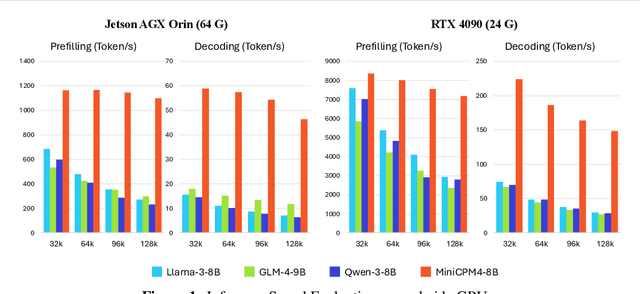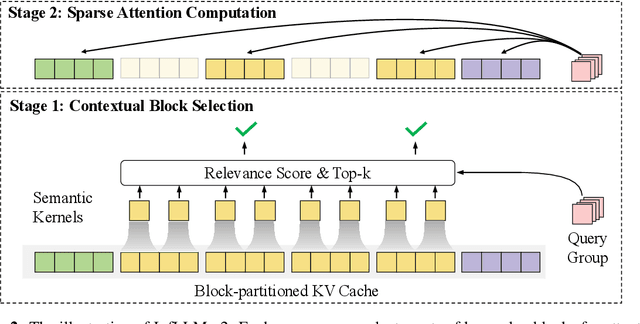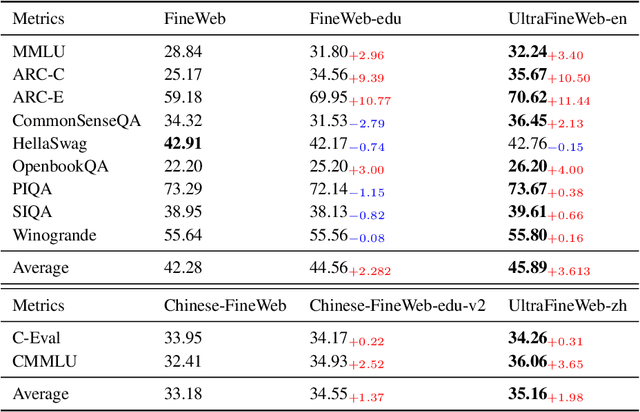Zekai Qu
JustRL: Scaling a 1.5B LLM with a Simple RL Recipe
Dec 18, 2025Abstract:Recent advances in reinforcement learning for large language models have converged on increasing complexity: multi-stage training pipelines, dynamic hyperparameter schedules, and curriculum learning strategies. This raises a fundamental question: \textbf{Is this complexity necessary?} We present \textbf{JustRL}, a minimal approach using single-stage training with fixed hyperparameters that achieves state-of-the-art performance on two 1.5B reasoning models (54.9\% and 64.3\% average accuracy across nine mathematical benchmarks) while using 2$\times$ less compute than sophisticated approaches. The same hyperparameters transfer across both models without tuning, and training exhibits smooth, monotonic improvement over 4,000+ steps without the collapses or plateaus that typically motivate interventions. Critically, ablations reveal that adding ``standard tricks'' like explicit length penalties and robust verifiers may degrade performance by collapsing exploration. These results suggest that the field may be adding complexity to solve problems that disappear with a stable, scaled-up baseline. We release our models and code to establish a simple, validated baseline for the community.
MiniCPM4: Ultra-Efficient LLMs on End Devices
Jun 09, 2025



Abstract:This paper introduces MiniCPM4, a highly efficient large language model (LLM) designed explicitly for end-side devices. We achieve this efficiency through systematic innovation in four key dimensions: model architecture, training data, training algorithms, and inference systems. Specifically, in terms of model architecture, we propose InfLLM v2, a trainable sparse attention mechanism that accelerates both prefilling and decoding phases for long-context processing. Regarding training data, we propose UltraClean, an efficient and accurate pre-training data filtering and generation strategy, and UltraChat v2, a comprehensive supervised fine-tuning dataset. These datasets enable satisfactory model performance to be achieved using just 8 trillion training tokens. Regarding training algorithms, we propose ModelTunnel v2 for efficient pre-training strategy search, and improve existing post-training methods by introducing chunk-wise rollout for load-balanced reinforcement learning and data-efficient tenary LLM, BitCPM. Regarding inference systems, we propose CPM.cu that integrates sparse attention, model quantization, and speculative sampling to achieve efficient prefilling and decoding. To meet diverse on-device requirements, MiniCPM4 is available in two versions, with 0.5B and 8B parameters, respectively. Sufficient evaluation results show that MiniCPM4 outperforms open-source models of similar size across multiple benchmarks, highlighting both its efficiency and effectiveness. Notably, MiniCPM4-8B demonstrates significant speed improvements over Qwen3-8B when processing long sequences. Through further adaptation, MiniCPM4 successfully powers diverse applications, including trustworthy survey generation and tool use with model context protocol, clearly showcasing its broad usability.
The Elephant in the Room: Rethinking the Usage of Pre-trained Language Model in Sequential Recommendation
Apr 12, 2024Abstract:Sequential recommendation (SR) has seen significant advancements with the help of Pre-trained Language Models (PLMs). Some PLM-based SR models directly use PLM to encode user historical behavior's text sequences to learn user representations, while there is seldom an in-depth exploration of the capability and suitability of PLM in behavior sequence modeling. In this work, we first conduct extensive model analyses between PLMs and PLM-based SR models, discovering great underutilization and parameter redundancy of PLMs in behavior sequence modeling. Inspired by this, we explore different lightweight usages of PLMs in SR, aiming to maximally stimulate the ability of PLMs for SR while satisfying the efficiency and usability demands of practical systems. We discover that adopting behavior-tuned PLMs for item initializations of conventional ID-based SR models is the most economical framework of PLM-based SR, which would not bring in any additional inference cost but could achieve a dramatic performance boost compared with the original version. Extensive experiments on five datasets show that our simple and universal framework leads to significant improvement compared to classical SR and SOTA PLM-based SR models without additional inference costs.
Thoroughly Modeling Multi-domain Pre-trained Recommendation as Language
Oct 20, 2023



Abstract:With the thriving of pre-trained language model (PLM) widely verified in various of NLP tasks, pioneer efforts attempt to explore the possible cooperation of the general textual information in PLM with the personalized behavioral information in user historical behavior sequences to enhance sequential recommendation (SR). However, despite the commonalities of input format and task goal, there are huge gaps between the behavioral and textual information, which obstruct thoroughly modeling SR as language modeling via PLM. To bridge the gap, we propose a novel Unified pre-trained language model enhanced sequential recommendation (UPSR), aiming to build a unified pre-trained recommendation model for multi-domain recommendation tasks. We formally design five key indicators, namely naturalness, domain consistency, informativeness, noise & ambiguity, and text length, to guide the text->item adaptation and behavior sequence->text sequence adaptation differently for pre-training and fine-tuning stages, which are essential but under-explored by previous works. In experiments, we conduct extensive evaluations on seven datasets with both tuning and zero-shot settings and achieve the overall best performance. Comprehensive model analyses also provide valuable insights for behavior modeling via PLM, shedding light on large pre-trained recommendation models. The source codes will be released in the future.
 Add to Chrome
Add to Chrome Add to Firefox
Add to Firefox Add to Edge
Add to Edge